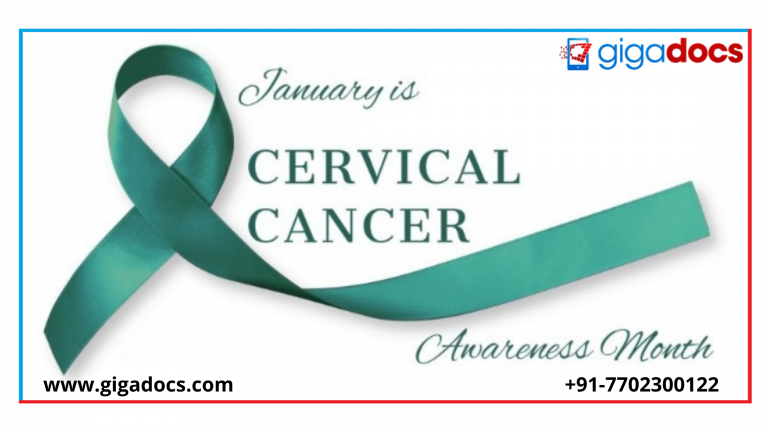Cancer can begin anywhere in the body. For females, Cervical cancer is a most worrisome cancer which develops gradually over time. Before cancer develops in the cervix, the cells undergo dysplasia, a process in which abnormal cells begin to appear in the cervical tissue. The abnormal cells may eventually develop into cancer cells and grow and spread deeper into the cervix and surrounding areas.
January is termed as the Cervical Cancer Awareness Month, let’s know a bit more about signs and symptoms of Cervical cancer, different kinds of Cervical Cancer, stages of Cervical Cancer, Cervical Cancer risk factors, Cervical Cancer survival rate, Cervical Cancer (HPV) vaccine, and treatment available:
Pre-Cancer Stage
Normal cells do not become cancerous overnight. Instead, normal cervix cells gradually develop anomalies known as pre-cancerous changes. Although cervical cancers begin in cells with pre-cancerous changes (pre-cancers), only a small percentage of women with cervix pre-cancers would also develop cancer. Pre-cancerous cells will disappear on their own in the majority of women. However, in some women, pre-cancers progress to true (invasive) cancers, mostly all cervical cancers can be avoided by treating cervical pre-cancers.
Cervical cancer screening can detect pre-cancer or cancer as early as possible when it is easier to treat and curable. The HPV test and the Pap test are used to screen for cervical cancer. The Pap test can identify precancerous changes in the cervix and treat them to avoid cancer cells from growing. The HPV test looks for infection by high-risk types of HPV, which are more likely to cause cervix pre-cancers and cancers. Although there is no cure for HPV infection, a vaccine can help prevent it.
Cervical Cancer Causes
The human papillomavirus, which is transmitted sexually, is responsible for most cervical cancer cases (HPV). Being infected with a cancer-causing strain of HPV does not guarantee that you will develop cervical cancer. The vast majority of HPV infections are eliminated by your immune system, often within two years.
HPV can also cause other cancers in women, such as breast cancer, vaginal cancer, anal cancer, rectal cancer, throat cancer, and vulvar cancer.
Signs and Symptoms of Cervical cancer
- Abnormal Vaginal Bleeding is the most common symptom of Cervical Cancer.
- Post-coital bleeding (bleeding after sexual intercourse) is the most specific symptom of Cervical Cancer.
- Other symptoms include foul-smelling and blood-stained vaginal discharge pain in the suprapubic region.
- Urinary frequency, incontinence, urgency, blood in urine, constipation, and rectal bleeding are common in patients with bladder and rectal involvement.
- Patients may also complain of excessive fatigue, unexplained weight loss, and appetite loss.
- Patients with Cervical Cancer who have spread to other organs have been known to experience abdominal pain and a feeling of fullness (stomach), nausea and vomiting, bone pain, a nagging cough, difficulty breathing, and other symptoms.
Types of Cervical Cancer
The cervix is divided into two sections and is covered by two distinct types of cells.
- The endocervix is the cervix’s opening that leads into the uterus. It is encased in glandular cells.
- The exocervix (or ectocervix) is the outer part of the cervix that the doctor can see during a speculum exam. It has squamous cells covering it.
Stages of Cervical Cancer
Staging refers to the process of determining whether cancer has spread within the cervix or to other parts of the body. The stage of the disease is explained by the information gathered during the staging process. It is critical to understand the stage to plan treatment. Cervical cancer progression is denoted by the stages I-IV.
Following a cervical cancer diagnosis, tests determine whether cancer cells have spread within the cervix or to other parts of the body.
Cervical Cancer Risk Factors
The following are the risk factors that can increase or decrease someone’s chances of developing Cervical Cancer:
- HPV infection- Common in 99 percent of Cervical Cancer cases. Cervical cancer typically develops after 10 to 20 years of ongoing HPV infection.
- Sexual intercourse – If you are less than 21 years, have multiple sexual partners, having many pregnancies, a history of sexually transmitted diseases such as HIV infection, and having a male sexual partner.
- Other risk factors include chemicals, hormones, and other carcinogens.
- Cigarette smoking may raise the risk of Cervical Cancer.
Cervical Cancer Survival Rate
- Cervical cancer that has not spread beyond the cervix or uterus has a five-year relative survival rate of 92%.
- Regional cervical cancer, defined as cancer that has spread beyond the cervix and uterus into nearby lymph nodes, has a five-year relative survival rate of 58%.
- Cervical cancer with distant spread to organs or other body areas has a five-year relative survival rate of 17%.
Factors influencing prognosis (likelihood of recovering) and possible treatments
The following factors determine the prognosis (probability of recovery):
- The stage of cancer (the size of the tumor and its spread).
- The person’s age and overall health.
- Whether the patient is infected with a specific type of human papillomavirus (HPV).
- Is the patient infected with the human immunodeficiency virus? (HIV).
- Whether cancer was recently discovered or has recurred (come back).
Cervical Cancer Treatment
Cervical cancer treatment options include:
- Surgery
- Radiation treatment
- Chemotherapy
- Targeted therapy
- Immunotherapy
The following factors determine treatment options:
- The cancer stage.
- The type of cancer.
- The desire of the patient to have children.
- The age of the person.
The treatment of cervical cancer during pregnancy is determined by the cancer stage and the pregnancy stage. One may postpone treatment until after the baby is born if cervical cancer is discovered early or during the last trimester of pregnancy.
Cervical Cancer After-Treatment
Some of the tests will continue to be performed even after the treatment is complete. The results of these tests can indicate whether or not your condition has changed or if cancer has returned (come back). These tests are also known as follow-up tests or check-ups. Your doctor will ask if you have any of the following signs or symptoms, which could indicate that cancer has returned:
- Abdominal, back, or leg pain
- Swelling in the lower leg.
- Difficulty urinating.
- Cough.
- Tired and fatigued.
Follow-up tests for cervical cancer are typically performed every 3 to 4 months for the first two years, followed by 6-month check-ups. The examination includes a current health history and a physical exam to look for signs and symptoms of recurrent cervical cancer and late effects of treatment.
Cervical Cancer Vaccine (HPV) in India
According to estimates, cervical cancer kills one woman every eight minutes in India. Cervical Cancer (HPV Vaccine) is currently sold in India by Gardasil and GSK (GlaxoSmithKline). The vaccine is primarily administered in private sector hospitals and is given only when patients request it or if a doctor prescribes it.
Cervical cancer awareness is extremely low in India, particularly in rural areas. Women are often shy and do not want to discuss their symptoms openly. Even though vaccines are available, many women are unaware of them. They are opposed to the idea of receiving a vaccination. Girls under the age of 9 receive cervical cancer vaccination with no booster requirement. HPV vaccination, recommended for girls aged 12 to 13, is one prevention method. Gardasil and GSK Cervarix will be given in three doses at 0, 1, and 6 months.
Cervical Cancer Diagnosis with Gigadocs
Gigadocs wishes all patrons and those bravely facing this condition a very happy Cervical Health Awareness Month. Each of us can improve our days, but we must first focus then implement a realistic daily plan that is often revised several times to help us achieve them.
Gigadocs is available for all your consultations; discuss your anxiety and fear with cancer specialists. Using the Gigadocs app, you can contact the best oncologists from the comfort of your own home.
Download Gigadocs App to Consult the Best Doctors –
- IOS App – apple.co/2W2iG4V
- Android App – bit.ly/33AQoRC
To know more and schedule a Virtual Consultation demo, Email @ info@gigadocs.com.




